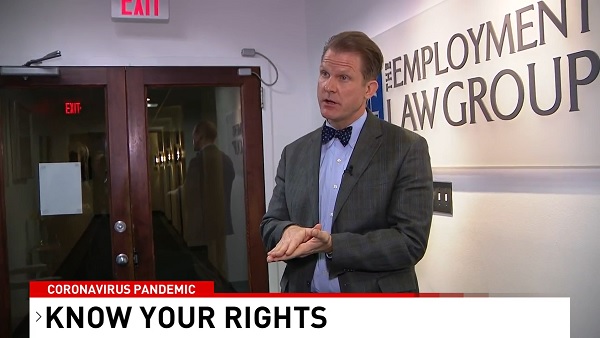
Date: March 18, 2020
ABC-7's "Good Morning Washington" program sent reporter Kristen Powers to interview TELG's Scott Oswald about protections for D.C.-area employees amid the growing COVID-19 (novel coronavirus) pandemic. In multiple segments over a period of about two hours, Scott addressed the most common employee concerns — with a special focus on the District's just-passed law that provides new ways for workers to get paid even if their employer suspends or ceases operations. IMPORTANT: Workplace laws and rules regarding COVID-19 have been changing rapidly; please consult an employment lawyer for up-to-date advice.
Quoteworthy:
"Tell your employer what's going on with you. And do it in writing."
R. Scott Oswald
[TRANSCRIPT]
DC Council passes emergency COVID-19 response bill to protect employees
(Transcribed and lightly edited by The Employment Law Group)
Kristen Powers (reporter): This whole situation is uncharted territory — so, as an employee, it is important to know your rights. We are bringing in attorney Scott Oswald with The Employment Law Group.
First off, what’s your biggest piece of advice for people right now who have some questions about their rights?
R. Scott Oswald: So the first thing you need to do is take a look at your employee manual — the one you got on the first day of work. Dust that off and see what it says, because a lot of what happens next is going to be in that manual, in writing. That’s the first thing.
Second thing is: Tell your employer what’s going on. If you’re sick, if you’re exhibiting symptoms, if you just fear coming to work, let your human resource department know that there’s a problem. And do it in writing. Send them an e-mail.
Powers: Do it in writing — I think that’s key.
So, next question: If someone doesn’t want to come into work, do they have a right to say “I don’t feel safe, I’m not coming in”?
Oswald: Certainly in D.C.
As of last night, D.C. has passed a new law which allows an employee to refuse to come to work if they feel unsafe and that feeling is objectively reasonable. So the employer has an obligation to create a safe and healthful work environment. If they’re not [doing that], you can say “I’m not coming in.”
Powers: What about people, then, in Maryland and Virginia? Is that still a big question mark?
Oswald: Huge. And that’s why we’re looking to Congress and what [was] passed [in the House] last Friday. Under the current [proposed] federal legislation, you can — you can do the same thing. But we’ll need to see whether that gets passed by the Senate and ultimately signed by the President.
Powers: With what’s going on federally, if something is passed — and you mentioned the new bill in D.C. — could people take advantage of both of those possible protections? Or does one trump the other?
Oswald: No. Both of these [would] apply and the employee can choose which protects them more expansively. So they can choose which of the laws to come under, and they don’t need to elect. All they need to do is let their employer know what’s going on. If they do so, and they do so in writing, they’re going to be protected.
Powers: All right, Scott — thank you. So it sounds like new protections if you do work in D.C. W’re going to have all of that information on our Web site, WJLA.com.
I’m Kristen Powers, ABC-7 News.



